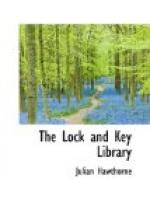“Know thyself,” said the Pythian of old. “That precept descended from Heaven.” Know thyself! Is that maxim wise? If so, know thy soul. But never yet did man come to the thorough conviction of soul but what he acknowledged the sovereign necessity of prayer. In my awe, in my rapture, all my thoughts seemed enlarged and illumed and exalted. I prayed—all my soul seemed one prayer. All my past, with its pride and presumption and folly, grew distinct as the form of a penitent, kneeling for pardon before setting forth on the pilgrimage vowed to a shrine. And, sure now, in the deeps of a soul first revealed to myself, that the Dead do not die forever, my human love soared beyond its brief trial of terror and sorrow. Daring not to ask from Heaven’s wisdom that Lilian, for my sake, might not yet pass away from the earth, I prayed that my soul might be fitted to bear with submission whatever my Maker might ordain. And if surviving her—without whom no beam from yon material sun could ever warm into joy a morrow in human life—so to guide my steps that they might rejoin her at last, and in rejoining, regain forever!
How trivial now became the weird riddle, that, a little while before, had been clothed in so solemn an awe! What mattered it to the vast interests involved in the clear recognition of Soul and Hereafter, whether or not my bodily sense, for a moment, obscured the face of the Nature I should one day behold as a spirit? Doubtless the sights and the sounds which had haunted the last gloomy night, the calm reason of Faber would strip of their magical seemings; the Eyes in the space and the Foot in the circle might be those of no terrible Demons, but of the wild’s savage children whom I had seen, halting, curious and mute, in the light of the morning. The tremor of the ground (if not, as heretofore, explicable by the illusory impression of my own treacherous senses) might be but the natural effect of elements struggling yet under a soil unmistakably charred by volcanoes. The luminous atoms dissolved in the caldron might as little be fraught with a vital elixir as are the splendors of naphtha or phosphor. As it was, the weird rite had no magic result. The magician was not rent limb from limb by the fiends. By causes as natural as ever extinguished life’s spark in the frail lamp of clay, he had died out of sight—under the black veil.
What mattered henceforth to Faith, in its far grander questions and answers, whether Reason, in Faber, or Fancy, in me, supplied the more probable guess at a hieroglyph which, if construed aright, was but a word of small mark in the mystical language of Nature? If all the arts of enchantment recorded by Fable were attested by facts which Sages were forced to acknowledge, Sages would sooner or later find some cause for such portents—not supernatural. But what Sage, without cause supernatural, both without and within him, can guess at the wonders he views in the growth of a blade of grass, or the tints on an insect’s wing? Whatever art Man can achieve in his progress through time, Man’s reason, in time, can suffice to explain. But the wonders of God? These belong to the Infinite; and these, O Immortal! will but develop new wonder on wonder, though thy sight be a spirit’s, and thy leisure to track and to solve an eternity.




